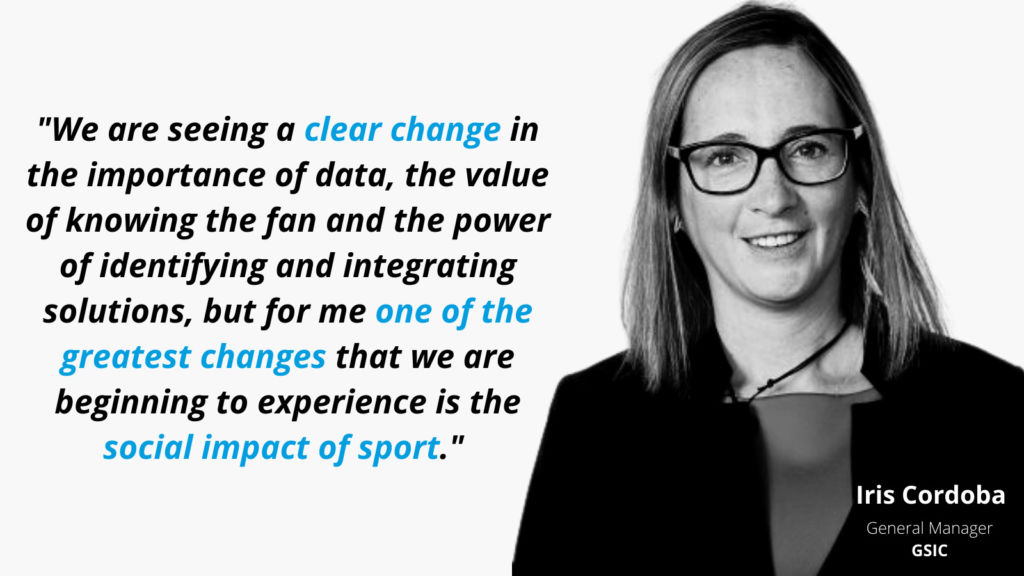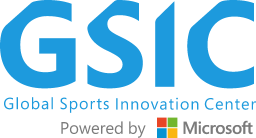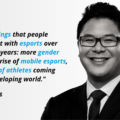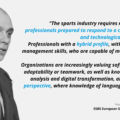01 Aug Have you met…Iris Córdoba? – 6 years of leading international reference innovation center
After 6 years of successful operation and growth, the GSIC is making an important step towards its international expansion and opens new office in Singapore to build the bridge of knowledge and eperience transfer between Europe, Asia and America.
This month we talked to General Manager of GSIC, Iris Córdoba, to summarize the evolution of GSIC over the past 6 years and discover what´s next.
Question: Iris, tell us how you started your career in the sports industry.
Answer: In the last 10 years I have been supporting initiatives of business clusters linked in a first stay to the cultural industries of language technology, tourism and entertainment and then in 2015 I accepted the challenge that Microsoft proposed me – to create the first innovation center focused on sport.
Q: How has the GSIC evolved in these 6 years?
A: The GSIC has evolved very positively. In 2015 we started a pioneering project at national level that has become an international reference. With the business cluster philosophy that was already promoted by the European Commission, we have been able to break some rules and make the first global cluster with members from more than 40 different countries. In 2015, the majority of GSIC members were from Spain and currently 60% of our members are from outside Spain. Therefore, we have seen an evolution in our ecosystem starting with less than 25 members and now we reach almost 250, seeing a positive evolution also in number of countries and in the profile of the companies. Currently we have an ecosystem where the weights of sports entities, governmental bodies, universities, startups, but also medium and small companies are reflected. At the beginning, when the GSIC was created, it was represented only by the trinomial of university, research centers and companies.
Q: In all these years, how has the entrepreneurship sector in the sports industry changed? What new technologies are there? How has it grown? What trends do we find?
A: Undoubtedly, since we opened the doors of the GSIC, the evolution of the sports industry involving technology, innovation and digital transformation has been brutal. Adding that we have recently lived through a pandemic with which we continue to coexist, as well as with its effects. In 2015, the aim was to support and offer knowledge to sports entities about the opportunity represented by digital transformation. Most sports entities did not have a digital plan, they did not have apps, they did not know information about their fans. They began to build on the idea that the fan was the center of attention, and today no one disputes that, no one disputes that sport is entertainment, that it is a generator of content and that it allows to generate new sources of income for sports entities.
This evolution has allowed the solutions and startups born around the sports industry to evolve. In 2015 we saw startups concerned about creating applications for clubs, applications that connect, booking applications etc. and the evolution has transformed this into new solutions such as the cloud, big data, machine learning, bots, artificial intelligence, augmented reality and today they are part of our life.
We can see and experience many activations and solutions with these technologies. A couple of years ago to think of a player using body sensors in order to monitor his performance was a challenge and today it is a priority most clubs in Europe and globally, they are already using this technology and we see an evolution where the scenario of sports performance is the one that is experiencing the most growth and it makes sense because it is the purest part of the sport.

Q: How do you see the future of the sports industry and entrepreneurship in 5 years?
A: We are seeing a clear change in the importance of data, the value of knowing the fan and the power of identifying and integrating solutions. But for me one of the big changes that we are beginning to see and that we are already experiencing today is the social impact on sport.
The pandemic has marked a before and after where brands and sports identities are much more committed to the environment, the concepts of new stadiums (Smart Venues) are built taking into account concepts that 6 years ago were totally unknown, such as the carbon footprint, stadiums committed to the environment and recycling, inclusive and accessible venues, etc. All this, to generate an equal experience for all fans and all these changes will make that in the coming years we will see a much more inclusive sport, more diverse, more committed to the environment where technology continues to be that tool that allows us to grow generating new experiences for fans and where some of the formats that we know traditionally change. We will continue working to support and to be present in this change.
Q: What are the next GSIC announcements?
A: We are very pleased with the evolution we have made at GSIC. From being a business cluster with an international vocation, we have managed to expand and position ourselves as a space for internationalization for our members. We are an associative space, but we generate real business opportunities for our members with formats such as Innovation Days, Inspiration Sessions, our GSIC Summit, networking sessions and we have evolved to not only be a meeting point but also a business point and create bridges and alliances in different continents. This year we are taking a very important step opening our office in Singapore. To be able to have a space in Asia between two regions where sport is undoubtedly key, is a personal and a team challenge that I am proud to lead.
Q: What would you highlight in your 6 years of experience at GSIC?
A: What I would highlight is team building. GSIC has managed to grow by stumbling and getting up, but above all, by knowing how to listen to its members and its team. One of the advantages that I would not change is that the GSIC has a young and multicultural team which helps us to have the sensitivity of different countries and I am personally proud that it is a place where women are represented. All in all, I am very happy. Undoubtedly, a big part of the learning is the trust in the team, in the members and in particular, the trust that Microsoft has placed in us with the support it gives us every day.
Q: What is your main lesson from 2020?
A: For me, the main lesson of this pandemic has been the difficulty of being able to connect with our loved ones and move freely taking into account the value of technology in this situation, because it has allowed us to connect and continue with our daily lives despite the distance and adversity.
Q: What is the most important professional plan for 2021?
A: The professional plan for this year is to do the GSIC set-up in Asia, put into operation and continue with the international expansion of GSIC.







